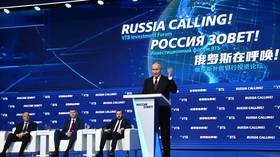EU wants China to help sanction Russia
The bloc threatened to “name and shame” 13 companies doing business with Moscow
The European Union may identify and possibly sanction more than a dozen companies based in China for providing Russia with goods that might be used in the Ukraine conflict, the bloc’s leaders have told reporters in Beijing.
European Commission President Ursula von der Leyen and European Council head Charles Michel were in China on Thursday, meeting with President Xi Jinping and Premier Li Qiang.
Von der Leyen said she had urged Xi “to prevent any attempts by Russia to undermine the impact of sanctions.” Michel handed the Chinese leader a list of 13 companies the bloc has accused of selling “dual-use goods” to Russia and asked him to “immediately” deal with the problem, according to Politico EU.
“We have identified a list of companies which are suspected to play a role in circumventing our sanctions,” Michel told reporters after the summit. “We sincerely hope that today we are heard, and then the appropriate action will be undertaken by China.”
If Beijing doesn’t crack down on the companies, the EU might “name and shame” them and “the member states will have to decide what further action to be done,” Michel said.
The US and its EU allies have imposed sanctions on Russia over the Ukraine conflict and sent billions of euros and dollars to prop up the government in Kiev, all the while insisting they were not a direct participant in the hostilities. China has refused to go along with the embargo, however, condemning it as “unilateral measures.”
“China is opposed to violations of the basic principles of market economy, [and] the politicization and securitization of economic and trade issues,” Li said after meeting with Michel and Von der Leyen. He added that Beijing “hopes that Europe would be cautious in rolling out restrictive trade policies and using trade remedies.”
Chinese Foreign Ministry spokesman Wang Wenbin did not address the sanctions threat at the regular press briefing on Friday. He did, however, weigh in on EU concerns about a growing trade deficit with China, which has doubled to almost €400 billion between 2020 and 2022.
The imbalance is the result of “macro-economic environment, international trade conditions and the two sides’ industrial structures,” Wang told reporters, noting that the surge in deficit was “largely affected by energy price and geopolitical factors.” The EU has faced skyrocketing energy costs after deciding to embargo imports of Russian oil and natural gas.
“China is not to blame for the inadequate impetus for the EU’s industrial growth, and the EU should not take this as a pretext to adopt trade protectionist measures,” Wang said, adding that if the bloc wants to reduce the imbalance, it could “ease the export restrictions on high-tech products.”






Comments are closed.